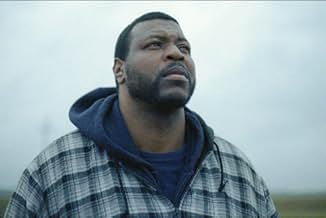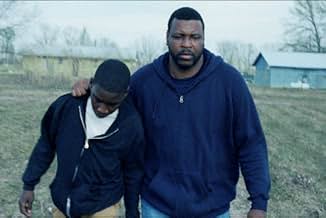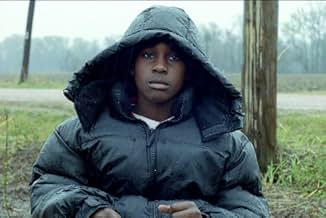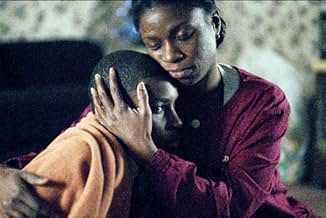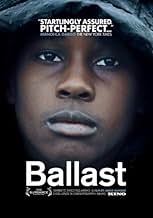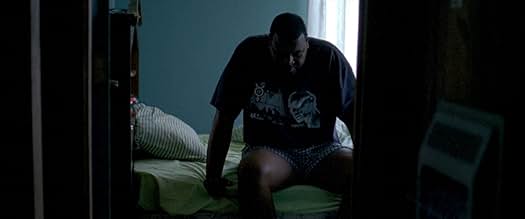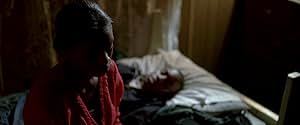AVALIAÇÃO DA IMDb
6,9/10
2,5 mil
SUA AVALIAÇÃO
Adicionar um enredo no seu idiomaA drama set in the Mississippi delta, where one man's suicide affects three people's lives.A drama set in the Mississippi delta, where one man's suicide affects three people's lives.A drama set in the Mississippi delta, where one man's suicide affects three people's lives.
- Prêmios
- 17 vitórias e 21 indicações no total
Neil Pettigrew
- Dispatcher
- (narração)
Sanjib Shrestha
- Dr. Shrestha
- (as Dr. Sanjib Shrestha)
Avaliações em destaque
First-time LA-based director Lance Hammer's powerful, naturalistic film seeks to capture what he sees as the prevailing sadness of the Mississippi Delta landscape through its concentrated portrait of a little black family torn by terrible grief and gradually struggling from despair to reconciliation and hope. Ballast begins with a shaky camera shot of a flock of birds flying away across a plain in the Mississippi Delta, then to violent events too fast to grasp completely. A white man, John (Johnny McPhail), comes to the door of a little house to ask Lawrence (Micheal J. Smith Sr.) what's wrong. He won't speak, goes outdoors and a shot rings out. He's shot himself. John calls 911 and Lawrence is rushed to the hospital. For a while this almost looks like an episode of "Cops." The hand-held camera throws the viewer in the heart of all this action with a palpable documentary-style intimacy.
Things cool down a bit as the camera moves over to the house nearby on the same lot where a mother, Marlee (Tara Riggs), lives with her teenage son James (JimMyron Ross). Marlee works in a lousy job cleaning latrines. James is on break from school and pays visits to young drug dealers he owes money to. Rudderless and confused about his dead father, a recent suicide and Lawrence's twin, who never visited him, James turns to desperate and risky behavior that he tries to hide from his mother. The drug dealers pay a threatening visit to James's house.
Back from the hospital Lawrence remains so paralyzed by grief over his brother's suicide perishables are going bad in his little convenience store and he can barely speak, let alone reopen the store and resume normal life. Marlee gets fired from her job and there's no money. James wanders the fields, his only friend perhaps the family dog, the half-wolf Juno. Slowly, the three let out their grievances and begin reconciliation and a solution that involves the property the twins' late father left them and an uneasy cooperation between Lawrence and Marlee.
Hammer's film-making, which got him consideration at the Berlinale and two top prizes for directing and cinematography at Sundance in early 2008, involves a strong camera and meticulous natural sound (with no music), but above all the director's own commitment to humanistic integrity. His various models include Mike Leigh, Charles Burnett, and the Dardennes--Leigh for the attention to family conflicts, Burnett for truth about African-American life, the Dardennes for a method in which the camera literally dogs the footsteps of ordinary people in crisis.
This isn't digital but 35 mm. Technicolor in widescreen, by Lol Crawley, edited by Hammer. Dolby Digital sound designed by Kent Sparling of George Lucas' Skywalker Sound and edited by Julia Shirar (who's worked with Sofia Coppola and Noah Baumbach) was designed by Sam Watson, a Mississippi native, all with close, committed involvement in the project.
Essential to Hammer's approach was to use local people in the main roles and a screenplay whose dialogue was frequently rewritten by the actors who embellished their scenes with improvisation. Even when James' dialogue at some points is nearly inaudible, the sound crew kept that. Though this may be a dubious nod to authenticity, the film is so involving that it hardly leaves the viewer time to think. If this is the Dardennes, it is the Belgian brothers working in top form--save for the ending, which is no resolution or even a question mark, just an abrupt blackout. However, the whole second half of the film is a struggle toward resolution that gives a surprise sense of hope slowly emerging out of what middle-class viewers in particular might tend to see as an utterly hopeless situation.
Seen as part of the San Francisco International Film Festival 2008. To be distributed by IFC Films in late August 2008.
Things cool down a bit as the camera moves over to the house nearby on the same lot where a mother, Marlee (Tara Riggs), lives with her teenage son James (JimMyron Ross). Marlee works in a lousy job cleaning latrines. James is on break from school and pays visits to young drug dealers he owes money to. Rudderless and confused about his dead father, a recent suicide and Lawrence's twin, who never visited him, James turns to desperate and risky behavior that he tries to hide from his mother. The drug dealers pay a threatening visit to James's house.
Back from the hospital Lawrence remains so paralyzed by grief over his brother's suicide perishables are going bad in his little convenience store and he can barely speak, let alone reopen the store and resume normal life. Marlee gets fired from her job and there's no money. James wanders the fields, his only friend perhaps the family dog, the half-wolf Juno. Slowly, the three let out their grievances and begin reconciliation and a solution that involves the property the twins' late father left them and an uneasy cooperation between Lawrence and Marlee.
Hammer's film-making, which got him consideration at the Berlinale and two top prizes for directing and cinematography at Sundance in early 2008, involves a strong camera and meticulous natural sound (with no music), but above all the director's own commitment to humanistic integrity. His various models include Mike Leigh, Charles Burnett, and the Dardennes--Leigh for the attention to family conflicts, Burnett for truth about African-American life, the Dardennes for a method in which the camera literally dogs the footsteps of ordinary people in crisis.
This isn't digital but 35 mm. Technicolor in widescreen, by Lol Crawley, edited by Hammer. Dolby Digital sound designed by Kent Sparling of George Lucas' Skywalker Sound and edited by Julia Shirar (who's worked with Sofia Coppola and Noah Baumbach) was designed by Sam Watson, a Mississippi native, all with close, committed involvement in the project.
Essential to Hammer's approach was to use local people in the main roles and a screenplay whose dialogue was frequently rewritten by the actors who embellished their scenes with improvisation. Even when James' dialogue at some points is nearly inaudible, the sound crew kept that. Though this may be a dubious nod to authenticity, the film is so involving that it hardly leaves the viewer time to think. If this is the Dardennes, it is the Belgian brothers working in top form--save for the ending, which is no resolution or even a question mark, just an abrupt blackout. However, the whole second half of the film is a struggle toward resolution that gives a surprise sense of hope slowly emerging out of what middle-class viewers in particular might tend to see as an utterly hopeless situation.
Seen as part of the San Francisco International Film Festival 2008. To be distributed by IFC Films in late August 2008.
"Ballast" is an independent film which many critics went "ballistic" with and was even nominated for several Independent Sprit Awards last year. Did it deserve it? No. Should it be ignored? No. "Ballast" stars Tarra Riggs as Marlee, an impoverished black mother living in rural Mississippi trying her best to make ends meat to raise her tweenage son James. James is a young drug addict who goes to extreme measures to support his drug habit. Example: James nonchalantly enters his Uncle Lawrence's home and holds him up at gunpoint to obtain money to purchase the drugs. Lawrence, "The Man From U.N.C.L.E. himself, depressive nature does not make him fight off the rebellious immaturity of James. Lawrence is profoundly grieving the suicide death of his twin brother Darrius, who was married to Marlee and is James' papa; even though Marlee & James despised Darrius because of his desertion of them both. Marlee eventually discovers James unrighteous ways and even loses her job. The desperate Marlee has no choice but to seek the assistance of neighbor Uncle Lawrence even though she has loathed him also because of his brother's actions. What happens next is a commending story of the power of connectivity of people going through harsh times and letting their unforgiving nature behind for the betterment of a child. Therefore, the central fixation is on sacrificing hang-ups in order to help a boy alter his self-destructive habits in order for him to have a promising & hopeful future. The performances of Michael Smith as Lawrence and the aforementioned Riggs as Marlee were authentically solid. Especially Smith's work, who spoke volumes with his non-verbal acting on the internal emotional pain of losing a loved one. JimMyron Ross as James was mediocre at best, but there were signs that with some more thespian training, the young Ross could have a successful acting future. Writer-Director Lance Hammer did nail the character development of the protagonists residing in poverty-stricken small town Mississippi, but I think Hammer screwed it up a bit on orchestrating too many stale & elongated scenes. Kudos does go out to the film's thematic & symbolist cinematography. "Ballast" is a mostly melancholy story which I do not think you will have a "ball" with, but it is a reliable moral narrative on the human nature of resiliency that deserves to be experienced. *** Average
10ephes3
A movie about life after suicide can be very hard to depict, Ballast brings out the reality of life after suicide and the consequences of those actions. Filming in the South was excellent. The realness of what can happen after suicide was depicted in James' character. So many kids who loose a parent (especially a father) turn to the rough side of life. Marlee and Lawrence's characters were so real. Both of them should be commended for their acting skills. This is a must see film. The entire cast was very good. Lance Hammer did an excellent job in writing, directing, and producing this film.I was wondering if this was written from true accounts? The plot is so real to what is happening today, especially in the south. James and Lawrence's characters were very believable. Using local non-professional actors was risky, but all of them did an awesome job. There is so much talent in the south. Kudos to the entire cast including those who spoke only by body language.I hope this film wins lots of awards. I hope to see more of Lance Hammer's work.
We saw this at Sundance 2008, and found it to be deliberately slow, but also quite thoughtful as it told the story of a man whose twin brother's suicide devastates him. The story extends to the dead man's ex wife and son and explores the aftermath of the suicide and its effects on these three characters. What makes this film impressive is that the actors involved in almost every role had never acted before. The director revealed to us at the Q&A session that he had gone to churches in the Mississippi Delta and recruited people to be in his film. Also notable is the sound, or lack thereof. Instead of a busy, noisy soundtrack, this was a quiet film with very little music, relying instead on the ambient noise of the area in which it was filmed. We enjoyed the film and wish the director and the actors much success.
Life is hard for a pimp. It is also hard for a poor mother (Tarra Riggs) to deal with after the suicide of her husband.
The twin/brother-in-law (Micheal J. Smith Sr.) is so depressed that he might just follow his brother, and her youngest (JimMyron Ross ) is heading in the wrong direction. They have a lot to deal with, and the film is about real people and how they deal with life and it's problems and setbacks.
The bleak cinematography really fits this film, as does the lack of a score. There is nothing to dance about, so why have music.
The inexperienced actors really shine, and writer/director Lance Hammer has much to be proud of in his first film.
Truly one of the best films of 2008.
The twin/brother-in-law (Micheal J. Smith Sr.) is so depressed that he might just follow his brother, and her youngest (JimMyron Ross ) is heading in the wrong direction. They have a lot to deal with, and the film is about real people and how they deal with life and it's problems and setbacks.
The bleak cinematography really fits this film, as does the lack of a score. There is nothing to dance about, so why have music.
The inexperienced actors really shine, and writer/director Lance Hammer has much to be proud of in his first film.
Truly one of the best films of 2008.
Você sabia?
- CuriosidadesMicheal J. Smith Sr. (who plays Lawrence) had to be persuaded to make the film as he had no interest in such things. In real life, he works for the Public Services Commission in Yazoo City, Mississippi and was discovered attending his local church.
- ConexõesReferenced in Film Junk Podcast: Episode 245: Fantastic Mr. Fox (2009)
- Trilhas sonorasI'll Wait For Jesus
Traditional
Arranged by Clora T. Handy & Ann Nichols
Performed by The Canton Gospel Chorus
Courtesy of Talk of the Town Records
Principais escolhas
Faça login para avaliar e ver a lista de recomendações personalizadas
Detalhes
Bilheteria
- Orçamento
- US$ 700.000 (estimativa)
- Faturamento bruto nos EUA e Canadá
- US$ 77.556
- Fim de semana de estreia nos EUA e Canadá
- US$ 8.572
- 5 de out. de 2008
- Faturamento bruto mundial
- US$ 81.864
- Tempo de duração
- 1 h 36 min(96 min)
- Cor
- Mixagem de som
- Proporção
- 2.35 : 1
Contribua para esta página
Sugerir uma alteração ou adicionar conteúdo ausente


